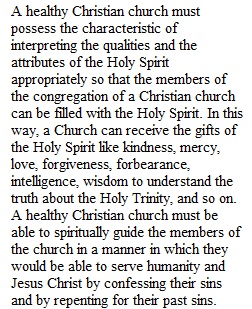


Q For this week you have read numerous epistles, or letters, from early Christian apostles like Paul, John, and James to the early believers. A doctrine is a set of firmly held beliefs, based upon what the Bible consistently and comprehensively says in various places about the same topic. In other words, no single passage forms a doctrine; the whole of the Bible works together to inform believers what God wants to teach. How do 1 Corinthians 12 and Acts 2:42-47 describe the church? In your own words, use the first paragraph to describe the characteristics of a healthy Christian church. Be as complete as possible. Describe some of the problems facing believers in the early churches, based upon Colossians 1, Ephesians 4-5, and Revelation 2-3. In the second paragraph, summarize the key points of Romans 3-6. Review Romans 7, 1 John 1:7-10, and 2 Corinthians 5:14-17. Discuss the struggle that people have with sin. The Bible teaches that sin is serious and should not be trifled with; the Bible also teaches that God forgives sin on behalf of Jesus Christ and gives power for the Christian to fight against succumbing to temptations to sin. Use the Study Bible resources to find two other verses from the epistles that describe God’s power of forgiveness and the strength to resist temptation to sin. Provide a thorough summary of Romans 8, indicating why it is one of the most precious chapters of the Bible as it relates to the Gospels. In the third paragraph, discuss one of the following: • Worship and life in the church, based on 1 Corinthians • How Christians should deal with disagreements, based on 1 Corinthians • How faith and ordinary life interact, based on 2 Corinthians • Unity, based on Ephesians Read Matthew 16:16 and Mark 16:16. Consider what they promise, along with John 3:16. In the fourth paragraph, compare and contrast Ephesians 2:8-10 and Romans 6:1-4 with James 1:19-27 and 2:14-26. What is the balance of faith and works? Describe what you think Jesus’ return and the beginning of the next life will be like, based upon Matthew 25:31-46, 1 Thessalonians 4:13-5:11, and 2 Thessalonians 2. What does God promise in Romans 8:1-3 for all believers?
View Related Questions